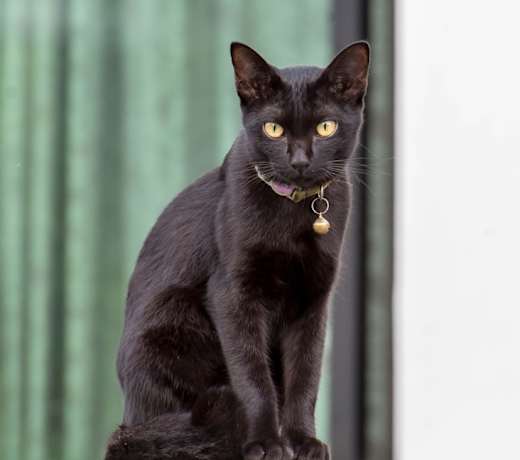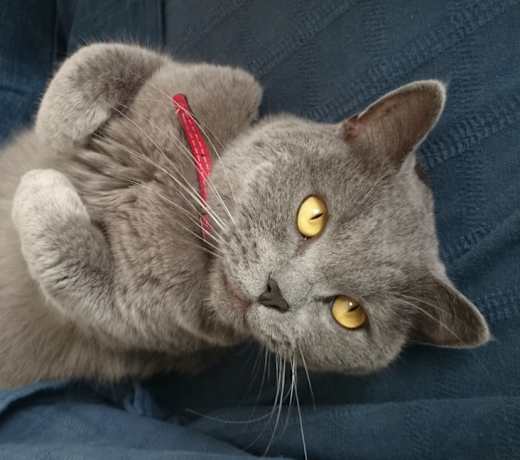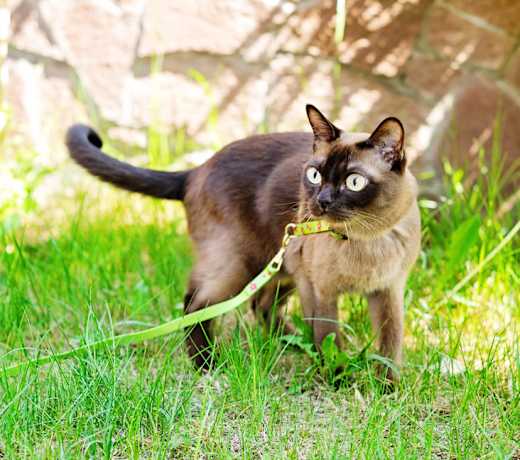American Shorthair cats stop growing by the time they are around three to four years old. This extended growth period helps them develop their sturdy and muscular build.
American Shorthair
Breed Type: Western
Common nicknames: ASH
Coat: Short-haired
Hypoallergenic: No, they will likely trigger allergies.
Temperament: Friendly, sociable, adaptable, energetic
Life expectancy: 15-20 years
Color & patterns:
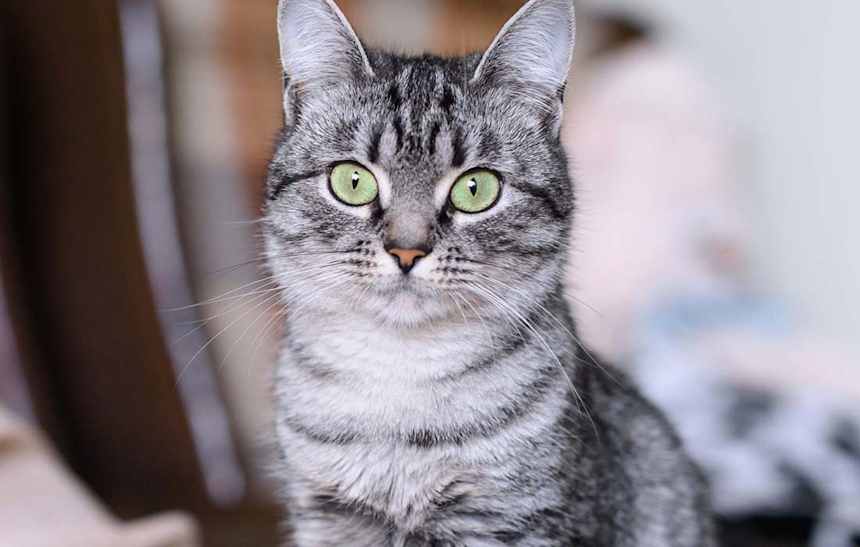
Meet the American Shorthair, an elegant, playful, and loveable. This breed is known for their classic good looks; they have round faces and can be a variety of colors and patterns, from sleek black to fluffy calico — there’s an American Shorthair to fit every taste. These cats are also a manageable size, typically weighing between eight and 12 pounds, which makes them easy to handle and perfect for cuddling. What sets American Shorthairs apart, though, is their friendly and laid-back personalities. They’re known for their adaptability, so they can thrive in just about any home environment, whether it’s a busy household with kids and pets or a quieter home with just one person. They’re affectionate and playful but also have an independent streak that makes them great companions for busy people. If you’re looking for a loyal and low-maintenance feline friend, the American Shorthair could be the cat for you.
American Shorthair characteristics
Learn about about American Shorthair basics like their fur colors, shedding levels, how much grooming they need, and other American Shorthair facts.
Average height
8-10 inches (20.3-25.4cm)
Average weight
6-15 pounds (2.7-6.8 kg)
Average lifespan
15-20 years
Good with other cats
Good with dogs
Affection
Shedding
Health
Exercise needs
What color coats can American Shorthair cats have?
American Shorthair cats can have a wide variety of coat colors and patterns. Some of the recognized colors and patterns for American Shorthairs include solid colors (black, white, blue, cream, and red), tabby patterns, bi-color (white with another color), tortoiseshell, calico, shaded and smoke, parti-color, silver and golden.
What eye colors can an American Shorthair have?
American Shorthair cats can have a variety of eye colors, including gold, green, blue, copper, and hazel.
How big do American Shorthair cats get?
American Shorthair cats are medium-sized. They typically weigh between 10 and 15 pounds for males and between eight and 12 pounds for females. They have a muscular, sturdy build with a broad chest and well-proportioned body.
How much do American Shorthair cats shed?
American Shorthair cats shed moderately. The short, dense coat sheds throughout the year, with increased shedding during seasonal changes such as spring and fall. Brush your cat’s coat weekly with a soft-bristled brush or grooming mitt to remove loose hair. This can help reduce shedding and minimize hairballs.
American Shorthair temperament
Learn about about the American Shorthair temperament and how well they fit into your lifestyle, home environment, and family.
Are American Shorthair cats good with dogs?
Yes, American Shorthair cats are good with dogs in general. Their friendly and easygoing nature allows them to form positive relationships with gentle dogs, especially if they are introduced properly and given time to adjust to each other. Cats that are confident and have been socialized to dogs from a young age tend to adjust more easily to living with dogs.
Are American Shorthair cats good with other cats?
Yes, American Shorthair cats are typically good with other cats. Their friendly and easygoing nature makes them adaptable to multi-cat households. They tend to be sociable and enjoy the company of other cats, often engaging in playful interactions and forming bonds with their feline companions.
When bringing a new cat into the home, gradual introductions are essential to ensure a smooth transition. Positive reinforcement and initially providing separate spaces for each cat can help minimize stress and promote positive relationships between cats.
Do American Shorthair cats meow a lot?
No, American Shorthair cats do not meow a lot. Their vocalization tends to be more moderate. Although they do meow to communicate — usually in response to specific needs or situations, such as seeking attention, food, or expressing discomfort — they are typically less talkative than breeds such as the Siamese or the Oriental Shorthair. Individual cats can vary, and some American Shorthairs might be more vocal than others.
Are American Shorthair cats friendly?
Yes, American Shorthair cats are friendly and sociable. They are typically good-natured and adaptable and get along well with people, including children and seniors. They also tend to be friendly with other pets, such as other cats and even dogs.
Are American Shorthair cats good hunters?
Yes, American Shorthair cats are good hunters. They have a natural hunting instinct, which is a trait inherited from their ancestors. American Shorthairs are agile and curious, with keen senses, all contributing to their ability to hunt and catch prey.
Are American Shorthair cats good indoor cats?
Yes, American Shorthair cats are good indoor cats, generally adapting well and thriving inside. Keeping American Shorthairs indoors helps protect them from outdoor dangers such as traffic, predators, and diseases and reduces the risk of accidents and injuries.
To ensure American Shorthair cats are happy and fulfilled indoors, give them plenty of mental and physical stimulation through interactive playtime, climbing structures, scratching posts, and toys to satisfy their natural instincts and keep them active and engaged. Cats who live indoors without opportunities to pursue prey can still practice their hunting behaviors; they might enjoy chasing toys, pouncing on moving objects and engaging in interactive play that mimics hunting behavior.
Are American Shorthair cats good lap-cats?
Yes, American Shorthairs can be good lap-cats, but their preference for sitting on laps can vary depending on their individual personality. Many enjoy being near their pet parents and choose to sit on laps for warmth and comfort, especially during quieter moments. However, American Shorthairs also have an independent streak, so they might prefer sitting next to their pet parents rather than on their laps, or they might enjoy brief lap sessions before moving on to other activities.
Are American Shorthair cats active?
Yes, American Shorthair cats are active. Their natural curiosity and energy keep them interested in and interactive with their surroundings. They enjoy playing with toys, especially those that stimulate their hunting instincts, such as wand toys or toy mice. American Shorthairs are curious by nature and like to investigate their surroundings. Providing them with opportunities to explore different areas of your home, such as climbing structures or cat trees, can help satisfy their need for exploration.
Are American Shorthair cats cuddly?
American Shorthair cats can be cuddly, but their cuddliness can vary. American Shorthairs are often described as being affectionate without being overly demanding of attention. They enjoy spending time with their people but are also content to entertain themselves. This balanced temperament makes them excellent companions for a variety of households. Many American Shorthairs enjoy being petted and scratched, but they might prefer to sit close to their pet parents rather than on their laps.
Do American Shorthair cats like to be held?
Some American Shorthair cats like to be held, while others might tolerate being held for short periods. However, like many cats, American Shorthairs value their independence and might prefer to be near their pet parents rather than being held. They might show affection in other ways, such as sitting beside you or rubbing against your legs. It’s important to respect your cat’s boundaries and preferences regarding physical contact — forcing them with too much handling can cause stress or discomfort.
American Shorthair health
Learn about about the American Shorthair health outlook and what diseases they may be prone to at various stages of their life.
Do you need to groom an American Shorthair cat?
Yes, you need to groom an American Shorthair cat to keep their coat in good condition. American Shorthairs benefit from weekly brushing to remove loose hair and distribute natural oils. Trim your cat’s nails every one to two weeks, and check their ears regularly for dirt, wax buildup, or signs of infection. Brush your cat’s teeth daily with a toothbrush and toothpaste formulated for cats. Use grooming sessions as opportunities to check your American Shorthair’s overall health, including feeling for any lumps, bumps, or changes in their skin or coat.
What do American Shorthair cats eat?
American Shorthair cats, like all cats, should eat a balanced diet that meets their nutritional needs for health and vitality. Most American Shorthairs thrive on high-quality commercial cat food formulated to meet the nutritional requirements of adult cats. Choose cat food that is labeled as complete and balanced, ideally meeting the standards set by organizations like the Association of American Feed Control Officials (AAFCO).
Look for cat foods that list a high-quality protein source, such as chicken, turkey, or fish, as the first ingredient. Wet or canned cat food can contribute to a cat’s overall hydration, which is important for their urinary tract health. Some cats also find canned food tastier than dry.
Are American Shorthair cats hypoallergenic?
No, American Shorthair cats are not hypoallergenic. Hypoallergenic breeds produce fewer allergens than other cats, but no breed is completely hypoallergenic. Cat allergens come primarily from proteins found in their saliva, skin oils, and dander (shed skin flakes).
Are American Shorthair cats healthy?
Yes, American Shorthair cats are healthy and robust cats. Like all breeds, they might be prone to certain genetic or hereditary health conditions, including:
Hypertrophic cardiomyopathy (HCM): This is a common heart condition in cats, including American Shorthairs. Regular veterinary checkups and screenings can help detect and manage this condition early.
Obesity: American Shorthairs can be prone to obesity if their diet and exercise levels are not properly managed. Maintaining a healthy weight through balanced nutrition and regular exercise is important.
Dental problems: Like many breeds, American Shorthairs are susceptible to dental issues such as gingivitis and periodontal disease. Regular dental care, including brushing your cat’s teeth daily, can help prevent these problems.
American Shorthair history
Learn about where the American Shorthair came from.
Where are American Shorthair cats from?
American Shorthair cats are from the United States, but their ancestors were originally from Europe. Early settlers brought cats with them to North America — they were valued for their excellent hunting skills to help control rodent populations on ships and in homes. Over time, these cats adapted to their new environment and developed into a distinct breed in the United States, eventually becoming known as the American Shorthair. The breed was officially recognized in the early 20th century.
What is the difference between American Shorthairs and domestic shorthairs?
The difference between American Shorthairs and domestic shorthairs is related to their breeding and characteristics. The American Shorthair is a recognized and standardized breed with a specific set of characteristics defined by pedigreed cat organizations. Breeders work to maintain certain traits in terms of appearance, temperament, and health. Domestic shorthairs are cats with short coats that do not belong to a specific breed. These mixed-breed cats can have a wide variety of appearances and temperaments.
Are tabby cats American Shorthairs?
Not all tabby cats are American Shorthairs, but some American Shorthairs are tabby cats. “Tabby” refers to a coat pattern rather than a breed. Tabby patterns include stripes, swirls, spots, and ticking, which can come in various colors. Any cat breed or mixed-breed cat can have a tabby coat pattern, including many recognized breeds such as the American Shorthair, as well as domestic shorthairs and domestic longhairs.
Find American Shorthair kittens near you
Adopting an American Shorthair
Learn about acquiring an American Shorthair - the pros and cons of adopting versus going through a breeder, and associated costs.
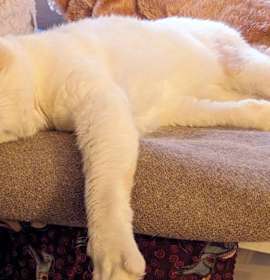
sweet Max FIV+
American Shorthair
Male, 6 yrs 6 mos
North Hollywood, CA
Needs special attention
Needs experienced adopter
Spayed or Neutered
Shots are up-to-date
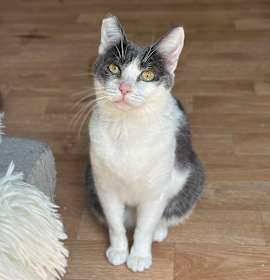
👑 princess Elsie
American Shorthair
Female, 4 yrs
North Hollywood, CA
Good with cats
Needs experienced adopter
House-trained
Spayed or Neutered
Shots are up-to-date

purring Buster
American Shorthair
Male, 5 mos
North Hollywood, CA
Spayed or Neutered
Shots are up-to-date
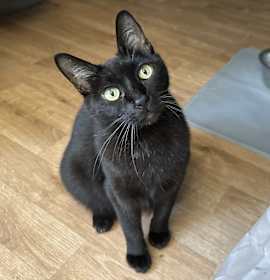
Phoebe sweet & shy
American Shorthair
Female, 6 yrs 7 mos
North Hollywood, CA
Not good with dogs
Spayed or Neutered
Shots are up-to-date

Aspen *video*
American Shorthair
Male, 1 yr 7 mos
North Hollywood, CA
Good with dogs
Good with cats
Spayed or Neutered
Shots are up-to-date
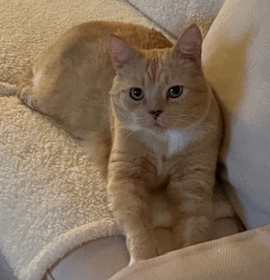
Mowgli
American Shorthair
Male, 9 yrs 4 mos
Sherman Oaks, CA
Needs experienced adopter
Spayed or Neutered
Shots are up-to-date

Gandalf the Gray
American Shorthair
Male, 2 yrs 1 mo
Los Angeles, CA
Good with dogs
Good with cats
Spayed or Neutered
Shots are up-to-date

Zoorey
American Shorthair
Female, 18 yrs 6 mos
Sherman Oaks, CA
Spayed or Neutered
Shots are up-to-date

sweet Max FIV+
American Shorthair
Male, 6 yrs 6 mos
North Hollywood, CA
Needs special attention
Needs experienced adopter
Spayed or Neutered
Shots are up-to-date

👑 princess Elsie
American Shorthair
Female, 4 yrs
North Hollywood, CA
Good with cats
Needs experienced adopter
House-trained
Spayed or Neutered
Shots are up-to-date

purring Buster
American Shorthair
Male, 5 mos
North Hollywood, CA
Spayed or Neutered
Shots are up-to-date

Phoebe sweet & shy
American Shorthair
Female, 6 yrs 7 mos
North Hollywood, CA
Not good with dogs
Spayed or Neutered
Shots are up-to-date

Aspen *video*
American Shorthair
Male, 1 yr 7 mos
North Hollywood, CA
Good with dogs
Good with cats
Spayed or Neutered
Shots are up-to-date

Mowgli
American Shorthair
Male, 9 yrs 4 mos
Sherman Oaks, CA
Needs experienced adopter
Spayed or Neutered
Shots are up-to-date

